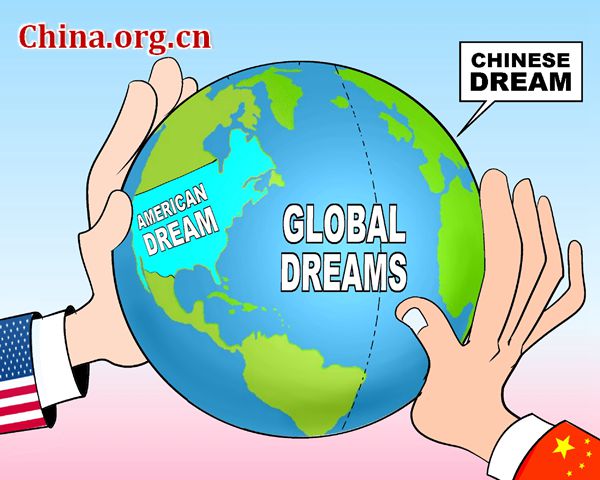Partisan rifts in China views
- By Mitchell Blatt
 0 Comment(s)
0 Comment(s) Print
Print E-mail China.org.cn, November 10, 2015
E-mail China.org.cn, November 10, 2015
|
|
|
Dreaming together [By Jiao Haiyang/China.org.cn] |
In 1972, President Richard Nixon visited China despite deep opposition from conservative Republicans.
Now, with a presidential campaign underway, China-U.S. relations are under the microscope again, and America could use a new Nixon. In October, after President Xi's visit to the United States, the Chinese magazine Southern Window (Nanfeng Chuang) published a graphic on American public views towards China. Along with other surveys, it shows a significant partisan divide, age group divide, and differences in terms of subject knowledge.
The general public is more likely to be overly concerned about China than experts on the subject. Only 27 percent of scholars think China poses a "major threat" versus 52 percent of the general public. At the same time, 84 percent of scholars think it is very important for the U.S. to build a strong relationship with China, versus 55 percent of the general public.
It may be the public is misinformed or simply uninformed about China and making assumptions based on suspicions, generalizations, or poor quality information.
And it is easy to see why. When the survey asked about partisan identification, Republicans were more likely to view China as a threat. Some 76 percent of Republicans in 2012 thought "loss of U.S. jobs to China" was a serious threat, compared with 67 percent of Democrats. In 2015, the survey also found even greater Republican concern on that issue, along with debt and the trade deficit.
Donald Trump is exploiting this to lead the Republican polls with warnings that China and other countries are "taking away American jobs." His xenophobic views are not limited to one country or people. He used the illogical new word "job theft" on October 29 to describe American companies hiring skilled foreign workers.
This could be bad for the Republican Party. According to an analysis by Cecilia Hyungjung Mo and colleagues at Vanderbilt University, the use of exclusionary and demeaning language towards minorities has hurt the party's standing among Asian-Americans.
It could also hurt the Republican Party's efforts at youth outreach. Younger people are more likely to tolerate minorities and foreigners.
This shows up in surveys on China as well. More young Americans (between ages 18-29) view China as a partner than enemy, while the opposite is true for seniors. Interestingly, most young Chinese have a favorable view of the U.S., while most older Chinese are negative.







Go to Forum >>0 Comment(s)